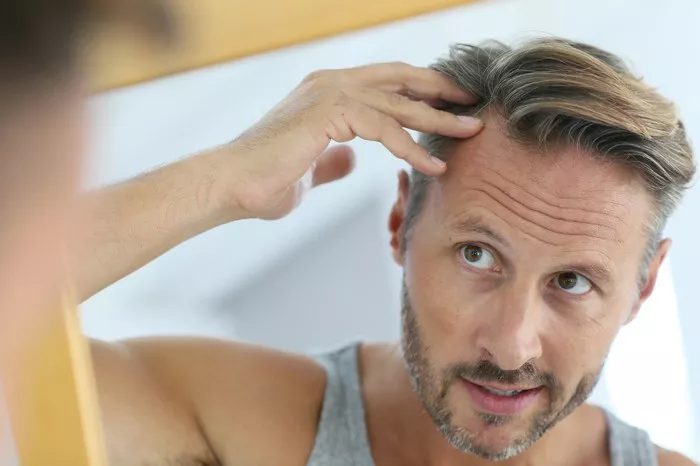Hair loss can be a distressing symptom of thyroid disorders, but there are strategies to manage and minimize this issue. When dealing with hair loss related to thyroid conditions, such as hypothyroidism or hyperthyroidism, taking proactive steps can make a significant difference. In this article, we’ll explore actionable methods to help you regain control over your hair health.
What is Thyroid Disease?
Thyroid disease encompasses a range of conditions that affect the thyroid gland’s function, leading to imbalances in hormone production. The thyroid, a butterfly-shaped gland in the neck, plays a pivotal role in regulating metabolism, energy levels, and various bodily functions. Hyperthyroidism involves excessive hormone production, causing symptoms like weight loss and anxiety. Hypothyroidism, characterized by insufficient hormone production, leads to fatigue, weight gain, and depression. Other thyroid disorders include thyroid nodules and autoimmune diseases like Hashimoto’s and Graves’ disease. Accurate diagnosis and management are crucial to maintain hormonal equilibrium and overall health.
Can Thyroid Disease Cause Hair Loss?
Thyroid disease can lead to hair loss. Both hyperthyroidism and hypothyroidism can disrupt the hair growth cycle. Hyperthyroidism accelerates the cycle, causing hair to shed prematurely, resulting in thinning. Hypothyroidism slows down the cycle, leading to hair becoming brittle and more prone to breakage. These imbalances affect the hair follicles and result in noticeable hair loss. Effective management of thyroid disease, through medication and lifestyle adjustments, can often help restore hair growth. If you experience significant hair loss, consulting a healthcare professional can help identify the underlying cause and develop an appropriate treatment plan.
How to deal with hair loss caused by thyroid disease?
While thyroid disease can cause hair loss, we offer some solutions to help you deal with hair loss. Here are some strategies:
1. Manage Thyroid Condition:
Addressing the root cause is paramount. Consult a medical professional to properly diagnose and manage your thyroid disorder. Proper medication and treatment can help stabilize hormone levels, which in turn can alleviate hair loss.
2. Nutrient-Rich Diet:
A well-balanced diet rich in nutrients can promote healthy hair growth. Focus on foods containing essential vitamins and minerals such as iron, biotin, zinc, and selenium. Incorporate lean proteins, leafy greens, nuts, and fruits to support hair health.
3. Consider Supplements:
In some cases, supplements can complement your diet. Consult your doctor before taking any supplements like biotin, which is known for supporting hair and nail health.
4. Gentle Hair Care:
Handle your hair gently to minimize stress and breakage. Use mild shampoos and conditioners that are sulfate-free and avoid vigorous towel-drying or combing when the hair is wet.
5. Avoid Heat Styling:
Heat styling tools can weaken hair strands. Limit their use and apply heat protectant products when styling is necessary.
6. Choose Low-Manipulation Styles:
Opt for hairstyles that don’t stress the hair follicles. Loose braids, ponytails, or letting your hair down can prevent unnecessary tugging.
7. Manage Stress:
Stress can exacerbate hair loss. Incorporate stress-reducing practices like meditation, yoga, or deep breathing into your routine to support overall well-being.
8. Scalp Care:
Maintaining a healthy scalp is crucial for hair growth. Use gentle scalp massages to stimulate blood circulation and promote follicle health.
9. Avoid Harsh Chemicals:
Refrain from using harsh hair dyes, bleaches, or chemical treatments that can further weaken your hair. Opt for natural or gentle alternatives if necessary.
10. Regular Check-Ups:
Continuously monitor your thyroid function through regular check-ups with your healthcare provider. Adjustments to medication and treatment can impact hair health.
Should Hair Loss Caused by Thyroid Disease Be Consulted with an Expert?
Absolutely, consulting an expert is crucial if you’re experiencing hair loss due to thyroid disease. Thyroid-related hair loss can indicate an underlying imbalance that requires proper medical attention. An endocrinologist, a doctor specializing in hormonal disorders like thyroid disease, can diagnose the root cause, assess hormone levels, and recommend appropriate treatment. They will work to manage your thyroid condition effectively, which in turn can help mitigate hair loss. A dermatologist or trichologist can also offer specialized insights into hair health and recommend tailored strategies. Consulting experts ensures you receive accurate diagnosis and comprehensive care for both your thyroid and hair concerns.
Conclusion
In conclusion, hair loss associated with thyroid conditions can be managed effectively by addressing the underlying thyroid issue and adopting a holistic approach to hair care and overall health. By nourishing your body with the right nutrients, being gentle with your hair, and managing stress, you can mitigate the impact of thyroid-related hair loss and pave the way for healthier, more resilient locks. Remember that your commitment to self-care plays a crucial role in restoring your hair’s vitality.


